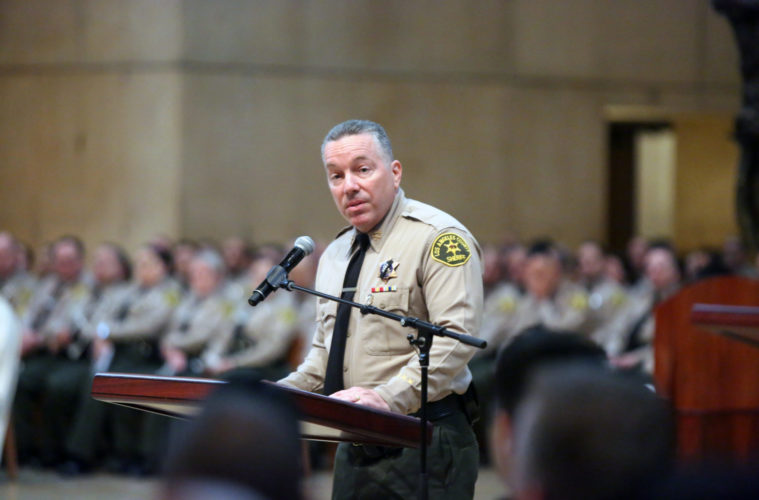As thousands of people take to the streets nationwide protesting racism and police brutality, law enforcement finds itself under a lens of scrutiny never seen before in the history of the United States. Los Angeles has seen some of the largest demonstrations in the country, with more planned. Protestors, activists and some politicians are calling for the removal of officers from schools, the expansion of community policing and, most commonly, defunding the police to pay for social programs.
“I think the movement to defund the police is irresponsible. I think it’s dangerous,” Los Angeles County Sheriff Alex Villanueva told L.A. Weekly publisher, Brian Calle, during an exclusive, longform interview on L.A. Weekly’s Weekly Podcast.
“At the end of the day everyone wants someone to show up when they call 911, and they don’t want a social worker to show up when they call 911, and that is the bottom line,” Villanueva said. “If these people are so confident in their movement, they need to put it on a ballot and let the entire community vote on it and we’ll see what the results are.”
Villanueva argues that what is happening elsewhere in the United States is not a reflection of his own agency. “We’re not Minneapolis, we’re not Atlanta, we’re an extremely professional, highly trained, motivated workforce,” he said. “We are a part of the community we serve.”
He also added that it is not right to lump all law enforcement together. “There’s generational issues, there’s regional issues, and the relationship between law enforcement and community varies. It varies street to street,” he said.
“It’s not uniform across the board that the entire Black community is at odds with law enforcement as some are trying to depict. It’s quite the opposite — there’s a lot of members of the Black community that are members of our department and we work and live in the same community, so it really depends on what your individual relationship with law enforcement is,” says Villanueva.
Reacting to the sheriff’s comments, Calle responded: “From my vantage point, going back over a decade now, I can’t tell you the number of police shootings I have covered or seen videos of — or in the case of George Floyd it wasn’t even a shooting — where an unarmed black man in particular is killed by police. I know you’re saying it’s regional and it’s from department to department, but when you’re seeing all the videos and you’re seeing these things happen one after the other after the other, what conclusions do you draw?”
“I’ll make this analogy for you,” Villanueva said. “The medical profession is estimated to cause the death of 200 to 250,000 people a year due to malpractice — either intentional or by accident — but there’s no cry to absolve or get rid of the medical profession, or defund health services in the country,” he said. “And there’s no claim of some grand conspiracy that links all the medical professions together as united in an effort to oppress a group of people for any reason, but somehow you’d transfer that over to law enforcement and all the sudden people entertain that thought.”
When asked by Calle if people of color should feel their lives are in danger by police the sheriff responded: “I think that’s absolutely false. From a statistical standpoint, people of color’s lives are not in danger from the police.”
Calle then pressed the question further: “You said that you don’t think people of color’s lives are at risk or at greater risk by police, but when I watch these videos over and over, like I’m telling you, over 10 years of being a journalist and seeing these things in agonizing ways, one after another, it’s very rare, if ever, that you see this with a white guy, or a white woman, it’s very rare to see it with an Asian guy or an Asian woman. It’s very rare to see it with a Latino. It’s almost every single time a black man.”
In response Villanueva said: “I think the image from the murder of George Floyd was so powerful in so many ways; it was symbolic of the history of oppression against the black community.” He continued: “We have to respect that and appreciate that. However, at the end of the day today, we have to make sure that one, we do not discriminate against anyone — we treat everyone equally, with respect, with dignity, with compassion — we have to see each other as a human being. But if people see someone in uniform and they’re a ‘pig’ and they’re worthy of throwing a rock or a brick at because they’re in a uniform, that’s not honoring the memory of George Floyd, that is not standing up against injustice. That’s just acting like a very reprehensible person; their opinion no longer counts when they engage in violence.”
The interview in its entirety can be found: iTunes, Spotify, Cumulus Los Angeles
Advertising disclosure: We may receive compensation for some of the links in our stories. Thank you for supporting LA Weekly and our advertisers.

